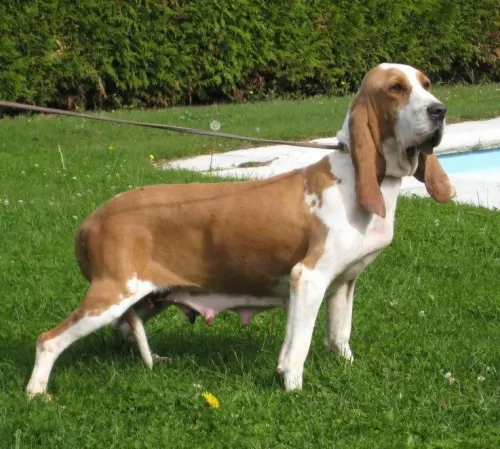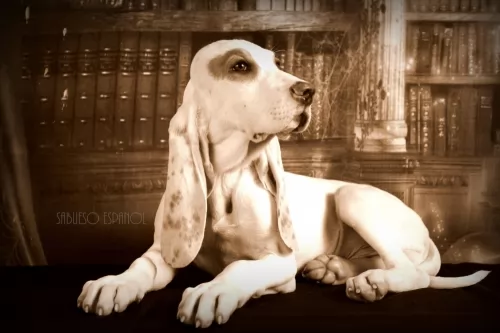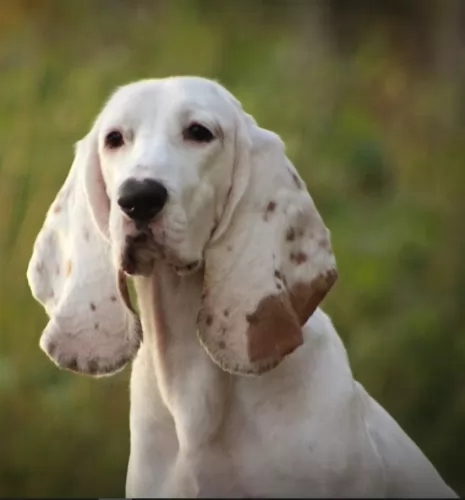 Petzlover
PetzloverCanadian Pointer is originated from United States but Sabueso Espanol is originated from Spain. Canadian Pointer may grow 18 cm / 8 inches higher than Sabueso Espanol. Both Canadian Pointer and Sabueso Espanol are having almost same weight. Both Canadian Pointer and Sabueso Espanol has almost same life span. Both Canadian Pointer and Sabueso Espanol has almost same litter size. Both Canadian Pointer and Sabueso Espanol requires Low Maintenance.
There are some dog breeds whose history and origins are dubious. The existence of the Canadian Pointer is also a matter of debate, and research reveals very scanty information.
The dog seems to have been a gundog which originated in the United States. Another name for the dog is Adirondak Pointing Dog. The Canadian Pointer was developed from English Pointers, Labrador Retrievers and Portuguese Pointers during the 19th century. He was used for hunting and retrieving prey such as birds and rabbits.
 The Sabueso Español is a Spanish Scenthound, hailing from the Iberian Peninsula, Spain. Beyond Spanish borders, this dog is virtually unknown.
The Sabueso Español is a Spanish Scenthound, hailing from the Iberian Peninsula, Spain. Beyond Spanish borders, this dog is virtually unknown.
There isn’t much on its origins but it is believed that it may have developed from the bloodhound. The dog has been used for hundreds of years to hunt down wild boar, deer and all kinds of game. To this day it is essentially a hunting dog and not particularly used as a pet.
When he is on the hunt, he uses his baying bark to communicate with the pack. The dog is recognised by the UKC under the category ‘Scent Hound’.
The Canadian Pointer makes for an excellent family pet. He is intelligent, excitable, loving and devoted, forming a strong bond with his human family. Active and excitable, it is this very energetic characteristic which will require him needing training and socialization. He is inclined to want to jump up against his family at the sheer joy of seeing them.
Although he loves country life, his love of human companionship allows him to adapt to city life and he is non-aggressive and can be a placid pet with children and other pets in the home.
The Canadian Pointer is a medium- to large sized breed of gundog. He has a lean, well muscled body with a short, coarse coat. The coat can be dark brown and white, black and white or a fawn color and white. The coat can also be freckled in parts.
He is a gundog belonging to the HPR group. HPR stands for hunting, pointing and retrieving. Weighing roughly 22–27kg, he stands about 56 – 76cm in height. Sometimes the tail is docked but otherwise it is left so that it’s medium length and is held straight out and level with the body. The ears of the Canadian Pointer are fairly short and floppy.
 Known also as the Spanish Hound, this medium-sized dog stands at between 47 and 58cm in height ad weighs 23 to 25kg.
Known also as the Spanish Hound, this medium-sized dog stands at between 47 and 58cm in height ad weighs 23 to 25kg.
The dog has very long ears, the eyes are amber colored and the long tail is thin ad whip-like. The coat is short and smooth and is mostly white with orangey, lemon or reddish brown patches.
People think that because these dogs are such excellent hunting dogs, they can't be a good pet, but they are calm and loving, making an excellent companion dog.
He is also good with children in the home. He will just need to be trained and socialized if you want him to be well mannered and obedient as he is independent and can be stubborn.
The Canadian Pointer is a dog who thrives on hard work and they are strong-willed, confident and boisterous but never aggressive. They’re intelligent and alert and respond well to training and socialization. Once trained he works hard to please his owner.
The Canadian Pointer is independent and can be aloof around strangers, but he just loves his human family and makes every effort to please them and be around them whenever he can. Treat him properly and he will give you endless hours of enjoyment and companionship.
 The attractive Sabueso Español is a calm, amicable, sweet dog that is loving towards his human owners. He is good with children but would prefer older children who know how to be kind and gentle towards him.
The attractive Sabueso Español is a calm, amicable, sweet dog that is loving towards his human owners. He is good with children but would prefer older children who know how to be kind and gentle towards him.
He isn’t aggressive and will get on well with other dogs in the house too. He is essentially an outdoor dog and will love nothing more than to have his family involved with him with activities outside.
If you’re looking for a great pet and companion for home and outdoor life, this dog is a superb choice.
Pointer dogs are looked upon as a healthy breed, but having said that, they aren’t immune to illness, and there are some common dog diseases that you should be aware of -
This disease is caused by a malformation of the hip joint. This ailment can result in pain and discomfort for your pet as well as arthritis and even lameness. Unfortunately there is no cure but the vet can do a lot to make life more comfortable for your pet.
This is a genetic eye disease where your pet gradually loses vision. The retina deteriorates and stops functioning.
 The Sabueso can live to be 12 years of age, but it is still good to be aware of typical dog illnesses that he can succumb to.
The Sabueso can live to be 12 years of age, but it is still good to be aware of typical dog illnesses that he can succumb to.
Hound dogs with floppy ears are known for getting ear infections. This is because floppy eared dogs don’t get the right amount of air circulation, and excess wax, dirt and moisture cause problems within the ear.
Excess body fat with a dog can create problems for your dog. Obesity is common in all dogs and dogs of all ages. Dogs that are obese don’t want to exercise. Obesity can cause a host of problems with your dog and even reduce his lifespan.
The Canadian Pointer was specifically developed to be a hunter so he is an energetic dog. When it comes to caring for him, training and socialization can make him an even more amicable pet. He is muscled and lithe and you want to keep him that way by ensuring he is well exercised.
Take him on walks, into the park with ball and frisbee or let him run while you cycle. Don’t leave him without exercise as he can become frustrated and ill.
The Canadian Pointer is a low maintenance breed with his short coat. You’ll need to give his coat a good brushing twice a week to rid him of loose hairs to keep the hair shiny and healthy.
Dogs like the Canadian Pointer with floppy ears will need to have their ears checked for infections to avoid hearing loss. You’ll see your dog shake his head, the inside of his ears may be red and he could have a moist discharge.
Remember that yeast and bacteria are problems with floppy-eared dog breeds and you’ll need to ensure that the ears are cleaned and kept dry. Be careful if you don’t know how to do it, and get advice from your veterinarian on how to attend to the ears of your dog.
 The short coat of the Sabueso Español makes him a low maintenance dog. and a brush twice a week is enough to keep his coat in tip top condition. As you brush him, make sure to check for any odd, new lumps you come across.
The short coat of the Sabueso Español makes him a low maintenance dog. and a brush twice a week is enough to keep his coat in tip top condition. As you brush him, make sure to check for any odd, new lumps you come across.
Check inside his ears, take a look at his eyes and make sure they’re bright and clear.
Look inside his mouth. He has no way of telling you if he has a rotten tooth causing him pain, and he relies on you to check on this for him.
Provide him with a dry, warm, comfortable bed.
These dogs are known for their stamina and energy and will ideally suit a home on a large property and not a small property in the city. They need lots of open spaces and plenty of exercise. They love long walks, preferably vigorous hikes, swimming and ball and rope games.
Ensure he is neutered or spayed if you want to avoid puppies.
Make sure his vaccinations are up to date to prevent deadly canine diseases.
Your Sabueso Espanol needs a nutritious diet if he is to remain healthy and happy. Commercially manufactured dog foods can be a good choice if you go for the high quality ones packed with vitamins and minerals. They can be convenient and well balanced. To provide your dog with some variety, provide him with some home-made food added into the dry kibble from time to time. No need to make home-made food all complicated and involved. Simply boil chicken, brown rice, sweet potatoes, carrots and spinach together, chopping it all up, and adding little bits of this to your dog's dry kibble twice a week. This will keep him happy and healthy. Try to include a bit of raw meat occasionally and never let your dog be without a constant source of fresh, cool water.